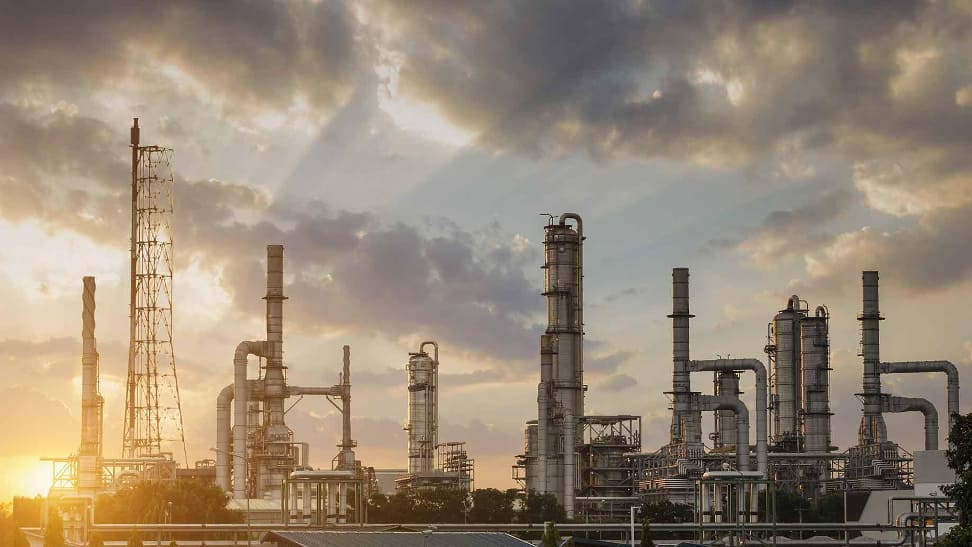Petrochemicals are widely used and produced chemical substances. The demand for most of our everyday goods depends on them. Their manufacturing process takes place in petrochemical plants where crude oil is refined in oil refineries and combined with natural gases to create petrochemical derivatives. Oil refineries play a large role in the production of petrochemicals, so let us dive into the relation between oil refineries and the petrochemical industry.
Are refineries part of the Petrochemical Industry?
What is an Oil Refinery?
Oil refineries conduct the process of converting crude oil into petroleum products that are later used for transportation, heating, paving roads, electricity generation, and feedstock for chemical production.
Crude oil is a natural resource extracted from the Earth, generally known as petroleum. It naturally occurs in liquid form and contains hydrocarbons and other organic materials formed by fossilized remains of animals and plants.
In any oil refinery, the process of oil refining will always include three steps: separation, conversion, and treatment. Separation involves piping oil in hot furnaces, resulting in a liquid that is transferred into distillation units. After the distillation, the process of conversion takes fractions from the distillation units to transform them into intermediate materials that will become finished products. Treatment of crude oil involves adding finishing touches to the final products as well as dealing with storage methods.

Because of their heavy use in the petrochemical industry through the production of raw materials used to make petrochemical derivatives, oil refineries are part of the petrochemical industry as they are part of the production process. In fact, according to the U.S. Department of Energy, around 6,000 manufactured commodities are made daily using petrochemicals derived from petroleum and natural gas, showing that oil refineries are crucial for petrochemical production and that both industries are highly dependent.
What are the 3 Main Products of a Petroleum Refinery?
Petroleum refineries can produce high-value products such as gasoline, diesel fuel, and jet fuel. They can also produce feedstock for the manufacturing of petrochemicals such as naphtha. These petroleum products are created when crude oil is distilled at different degrees of heat.
Gasoline, for instance, is used to fuel vehicle engines. Being one of the most frequently used and produced petroleum products, about 134.55 gallons of finished motor gasoline were consumed in the United States alone in 2022. The petrochemical feedstock is also made from petroleum. Petrochemicals are essential in producing commodities like cosmetics, rubber, plastics, and solar panels.
Why Oil Refineries are Situated on the Coast?
Locating oil refineries mainly on the coast due to their water requirements and facilitating imports and exports of petroleum products. Some refineries use significant amounts of steam and cooling water making it important for them to be located by coasts or ports to give better transportation access. In an oil refinery, water usage is mainly for cooling boilers, processing sanitary services, and fire protection.
Typically, a refinery will use around 1.5 barrels of water to process 1 barrel of crude oil. This can vary depending on the refinery and the petroleum product being produced. For example, when producing gasoline, a refinery will consume 0.60 to 0.70 gallons of water for every gallon of gasoline. The total amount of water used in a refinery is generally monitored, especially to verify the absence of any contaminants.
Are there Oil Refineries in Egypt?
There are several oil refineries in Egypt. Nine out of ten oil refineries are run by the state. Egypt currently stands as the biggest oil refiner in Africa, with a total of ten refining companies operating 12 refineries. Some of these refineries include the Middle East Oil Refinery (MIDOR), the Cairo Oil Refining Company (CORC), and the Egyptian Refining Company (ERC).
Investments in oil refineries in Egypt saw a notable increase since the 2016/2017 fiscal year, where EGP 4.11 billion were invested in oil extraction firms, according to the Egyptian Central Bank, compared to EGP 724 million in the 2015/2016 fiscal year.
Among the oil and gas companies in Egypt is the leading petrochemical firm; Anchorage Investment uses crude oil and natural gases to manufacture petrochemical derivatives locally and regionally. Their most recent project, Anchor Benitoite, is set to be a petrochemical complex in Suez, Egypt. The project aims to be a regional and local success by benefiting from location and market merits.
In conclusion, oil refineries are a crucial part of the petrochemical production process. Recalling that petrochemicals are made from crude oil and natural gases, oil refineries are part of the first steps toward making petrochemical feedstock. Crude oil, also known as petroleum, is naturally found and extracted from fossilized remains of animals and plants. When extracted, petroleum is distilled and heated in oil refineries. The different petroleum products are determined and produced based on the different heat levels to which petroleum is boiled.
